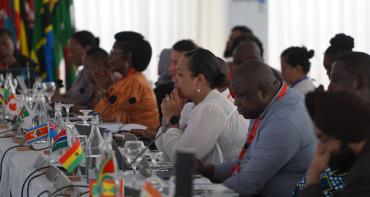A blog by Roger Koranteng, anti-corruption adviser and head of public sector governance at the ĚÇĐÄĚ˝»¨.

The year 2016 saw increased scrutiny of global anti-corruption efforts thanks in no small part to the conference, hosted by the ĚÇĐÄĚ˝»¨, which preceded the London Anti-Corruption Summit, in May.
As President Muhammadu Buhari of Nigeria stated in his keynote address, which made international headlines, corruption poses an “immediate and credible threat” to global stability, necessitating a partnership between government, private sector and civil society to combat it.
“A main component of this anti-corruption partnership is that governments must demonstrate unquestionable political will and commitment to the fight,” President Buhari noted. “The private sector must come clean and be transparent, and civil society, while keeping a watch on all stakeholders, must act and report with a sense of responsibility and objectivity.”
This momentous conference and summit saw many jurisdictions committing to maintaining registers of beneficial ownership for usage by law enforcement. Most jurisdictions also agreed to automatic exchange of information for tax purposes and almost all committed to greater co-operation and a more co-ordinated response to corruption.
But despite these outcomes, there are strong indications that most countries are ill-equipped to meet the challenges of financial crime prevention. There is, thus, an urgent need to reinforce the aims of the London conference under a technical action plan and measurable targets.
Throughout the year, the ĚÇĐÄĚ˝»¨ has worked to provide targeted assistance to Commonwealth nations. Moving beyond mere rhetoric, we have been active in providing for national anti-corruption agencies, with a focus on Africa and the Caribbean.
This has built on our long-standing support to establish regional networks including the Association of Anti-Corruption Agencies in Commonwealth Africa, linking national agencies across our 18 African member countries, as well as the Commonwealth Caribbean Association of Integrity Commissions and Anti-Corruption Bodies, which supports a dozen Caribbean member nations.
These networks promote collaboration and learning by brokering the exchange of best practices and helping to benchmark agencies’ capabilities, while also facilitating peer reviews and secondments between members.
The , established as a partnership with the Government of Botswana, continued in 2016 to host many training courses co-ordinated with the ĚÇĐÄĚ˝»¨. The centre’s programmes are designed to address capacity constraints at all levels within national agencies, from heads of agencies to operational staff. Since its launch in 2013 nearly 7,000 personnel have benefitted.
The Secretariat has been active in research as well, undertaking a diagnostic and benchmarking survey to identify gaps in anti-corruption policies and procedures in national agencies in Commonwealth Africa. We have also helped to identify weaknesses in how agencies manage exhibits and proceeds of crime and have developed a Commonwealth standard operating framework to help them make improvements.
In a practical way, the Commonwealth is delivering on the global anti-corruption agenda. Our programme work has provided a visible and tangible demonstration of the Commonwealth’s commitment to support members’ anti-corruption efforts, through capacity building, research, exchange of best practices and sharing frameworks and devising template solutions to common problems.
As we head into 2017, we will continue to build on the great enthusiasm and spirit of co-operation generated by the Tackling Corruption Together conference, providing a platform and forum through which anti-corruption agencies can deliver on the promises made by world leaders.
As Secretary-General Patricia Scotland reaffirmed in her in December, the Commonwealth is absolutely committed to supporting its member countries in this effort. “ĚÇĐÄĚ˝»¨ will be in the forefront of innovative thinking and practical action to eliminate the scourge of corruption,” she said.


